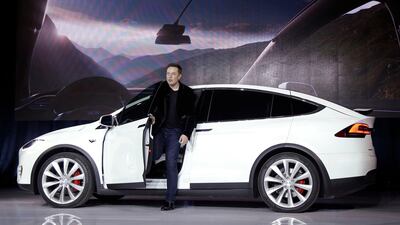Tesla has slashed up to $14,000 off its Model X in China after Beijing announced major tariff cuts for imported automobiles, a potential sales boost for the US firm as the world's largest car market pivots towards electric cars.
The car maker will lower prices of its Model S and Model X cars by just over 6 per cent, a Beijing-based sales representative said on Wednesday.
China said on Tuesday it will cut import tariffs for automobiles to 15 per cent from 25 per cent, a fillip for premium car brands like Tesla and BMW which import a significant number of vehicles.
Tesla said on Tuesday that any of its cars sold in China would be subject to adjusted prices, even before the tariff change comes into effect on July 1.
_______________
Read more:
Lexus, BMW and others to benefit with China said to cut car import duty
Golf carts a must-have for wealthy Hong Kong homeowners
_______________
The price of a top-of-the range Model X will be cut to 1.3 million yuan (Dh748,565) but that remains well above the $140,000 cash price-tag before savings for the priciest version in the United States - Tesla's Model X P100D.
The move by the California-based electric car maker likely foreshadows wider price cuts for imported cars in China as foreign firms look to narrow a price gap with domestic rivals. Imports, however, only make up a fraction of the overall market and tend to be upper-end models.
Yale Zhang, head of Shanghai-based consultancy Automotive Foresight, said price cuts by foreign premium brands will likely force them to adjust the price tag for vehicles they produce locally in China. This in turn will gradually impact the price of more affordable, mainstream cars - even local Chinese brands.
"With imminent price adjustments in the higher-end segment, that will over time lead to a pricing adjustment for the entire market," Mr Zhang said.
Other car makers, including Toyota and BMW, said after the tariff cut that they would look at adjusting their retail prices in China to provide competitive offers to consumers.

